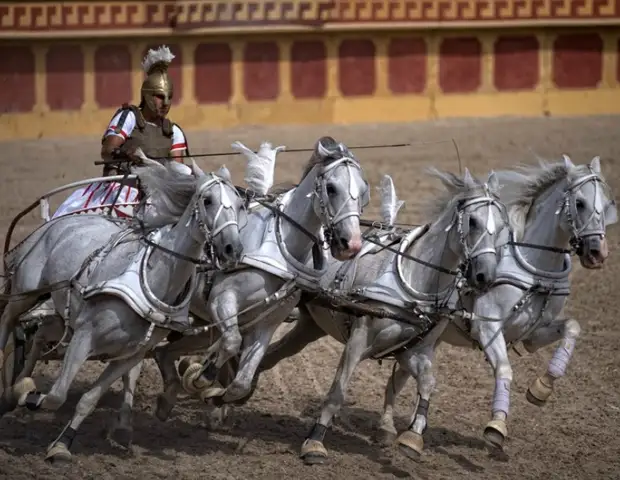No products in the basket.
Chariot racing is one of the most thrilling, visceral and danger-filled sports ever invented by man. Present at the Ancient Olympic Games from 680BC, it continues to capture our attention and fuel our imagination more than two-and-a-half thousand years later. “You can’t quite comprehend the power of four horses when they hit stride together,” says Boyd Exell, the four-time four-in-hand International Equestrian Federation (FEI) world champion. (https://olympics.com/ioc/ancient-olympic-games/chariot-racing)
Obviously, such a challenging and dangerous sport requires a substantial prize for the winner…so, with what were the heroes of the Ancient Olympic Chariot races rewarded?
A woman. The prize was a woman – and 140 ceramic pots full of olive oil. There was some variation, however, as legend has it that Diomedes received a slave woman and a cauldron.
In contrast, the 1000BC athletic ‘Games of Hera’ – specifically for women competitors – offered pomegranates and slices of sacrificial cow as first prize for its female athletes. (https://faculty.elmira.edu/dmaluso/sports/timeline/index.html)

Women in the Greek state of Sparta were also engaged in horse-riding, racing and wrestling.
Interestingly, carvings on Egyptian tombs and paintings indicate that women of that period were physically active. Evidence suggests women in the Greek state of Sparta were also engaged in horse-riding, racing and wrestling. During the ancient period, women were not stigmatized for their involvement in sport and physical activity. (https://www.sportanddev.org/latest/news/tracing-challenging-history-women)
How frustrating then that now, in the 21st century, a recent survey by ‘Women in Sport’ found that a fear of being judged and a lack of confidence were the main reasons cited for a waning interest in sport among teenage girls. Its poll of more than 4,000 teenagers found that 43% of girls felt they were sporty at primary pupils but no longer saw themselves this way. This would equate to 1.3 million girls across the UK, the survey pointed out. Out of these girls, 68% said that a fear of feeling judged prevented them from taking part, while 61% said they lacked confidence. (https://www.theguardian.com/education/2022/mar/07/uk-girls-lose-interest-in-sport-as-teenagers-women-in-sport-survey)
“Teenage girls are not voluntarily leaving sport, they are being pushed out as a consequence of deep-rooted gender stereotypes. We must all do more to reverse this trend and not continue to accept this as inevitable,” comments Stephanie Hilborne, the chief executive of ‘Women in Sport’.
Inspired to counteract this unnecessary loss of female sporting talent and damaging lack of exercise amongst girls, ‘This Girl Can’ was launched in 2015 and used lottery funding for their campaign to celebrate ‘active women who are doing their thing no matter how they look, how well they do it or how sweaty they get. We want to challenge the conventional idea of what exercise looks like and reach out to women of all backgrounds and ethnicities who feel left behind by traditional exercise.
In doing so, we’re aiming to inspire more women and girls to wiggle, jiggle, move and prove that judgement, time, money and energy are barriers that can be overcome.’ (https://www.thisgirlcan.co.uk/) (https://www.sportengland.org/funds-and-campaigns/this-girl-can)
Similarly, ‘We are Girls in Sport’ shares the same ethos. ‘We are on a mission to increase the participation and retention of girls and women in sports and physical activity. There is growth and momentum in women’s sport and we want to encourage more young girls to find a sport they love. When they find it, the key is to encourage them to stick with it, or if not, to try another sport. It is worrying to read so many reports and studies from across the world of how there is a significant drop in girls walking away from sports they once enjoyed as soon as they hit puberty. We want to inspire and encourage our girls to keep going. (https://www.wearegirlsinsport.com/about-us)
Time to get back those ancient attitudes and see women and girls as the powerhouses – emotionally, mentally, academically and physically – that they have the potential to be in our modern world.
Following The London 2012 Olympic and Paralympic Games, the government recognised that there had been ‘outstanding performances from our female athletes and raised the profile of women’s sport. The impact was immediate: nearly 626,000 more women are playing regular sport since we won the Games bid. But though nearly 7 million women play sport weekly, 9 million more would like to start playing or to play more sport,’ and realised that there needed to be ‘more coverage of women’s sport in the media.’ (https://www.gov.uk/government/news/women-in-sport)
Fast forward to 2022 when ‘The government has heeded the calls of the Lionesses after their historic Euro 2022 win and committed to providing equal access to all sports in PE for boys and girls in England, a minimum of two hours of PE a week and a multimillion‑pound investment in school sports and after‑school activities.
The day after the Wembley final, the Lionesses wrote an open letter to the Tory leadership candidates Rishi Sunak and Liz Truss laying out demands which are now being met. Leah Williamson, the England captain, greeted the announcement – on International Women’s Day – by saying “this is the legacy that we want to live much longer than us as a team… The success of the summer has inspired so many young girls to pursue their passion for football. We see it as our responsibility to open the doors for them to do so and this announcement makes that possible.” (https://www.theguardian.com/sport/2023/mar/08/government-pledges-equal-access-to-school-pe-sports-for-boys-and-girls)
August 2023 sees the Netball World Cup in South Africa and the Women’s Football World Cup in Australia and New Zealand continuing to bring impressive female sporting talent to a global audience.
Giving women and girls higher profiles in the media is one significant way forward but a girl cannot thrive on air alone – the evolution of female sport has got to put its money where its mouth is.
Shocking that Serena Williams is the only woman ranking among the world’s 50 Highest-Paid Athletes this year (https://www.mensjournal.com/news/serena-williams-highest-paid-female-athlete-2023). It has taken four Olympic golds and a total of 39 Grand Slam titles for her to be ‘allowed’ in that top 50. (https://www.iberdrola.com/social-commitment/women-athletes)
From this financial ‘mismanagement’, we could be forgiven for thinking that few women in the past had deserved to be high earners… and then you realise that inspirational, talented sportswomen have been around for a long time, including:
- Nadia Comaneci: at the age of 14 and a half at the 1976 Games in Montreal she achieved a score of 10 (the first in history) in her asymmetric bars exercise. Talent, balance, flexibility, concentration, strength and a lot of training made the Romanian gymnast a legend. During her career she won a total of nine Olympic medals.
- Edurne Pasaban. The girl from Guipúzcoa climbed Mont Blanc at 16, and at 28 had already conquered Everest, her first eight-thousander. But her name was engraved in the mountaineering record book when on 17 May 2010 she reached the summit of Shisha Pangma (8,027 metres above sea level) and became the first woman to complete the feat of climbing the 14 eight-thousanders.
- Ellen MacArthur: sailed round the world…and not only did she circumnavigate the globe alone, she also did it faster than anyone had done before: 71 days, 14 hours, 18 minutes and 33 seconds (one day and eight and a half hours faster than the Frenchman Francis Joyon). After her retirement she dedicated herself to protecting the oceans through the MacArthur Foundation.
- Marta Vieira da Silva is just known as Marta has had a long and successful career: at club level she has won virtually everything and with her team she has scored 111 goals in 131 matches, which are amazing figures. In addition, she is the only footballer to win the FIFA prize for the best female player in the world five times running, to which she added a sixth eight years later.
- https://www.iberdrola.com/social-commitment/women-athletes
Time now for every girl to find that true lioness within her and take sport and exercise to whatever level she wishes, whenever and wherever she wishes. Break those barriers, shatter those stereotypes.
Marta Vieira da Silva – Believe in yourself and trust yourself. Because if you don’t believe in yourself no one else will.
Nadia Comaneci – I don’t run away from challenges, I run towards them because the only way to escape fear is to overcome it and trample it beneath your feet.
Alice Coachman (High Jump Gold 1948 Olympics) – I’ve always believed that I could do whatever I set my mind to do. I encourage women to work harder and fight harder.
Ellen MacArthur – You don’t fear for your life in the middle of a storm, you can’t really afford to.

